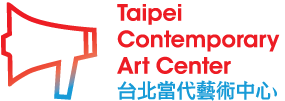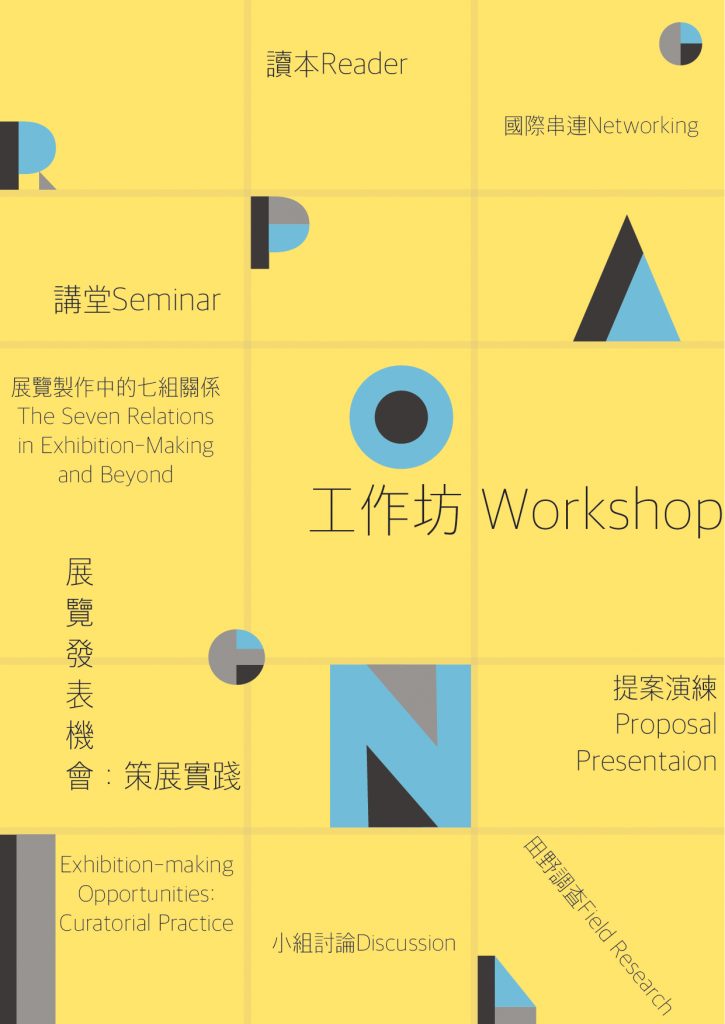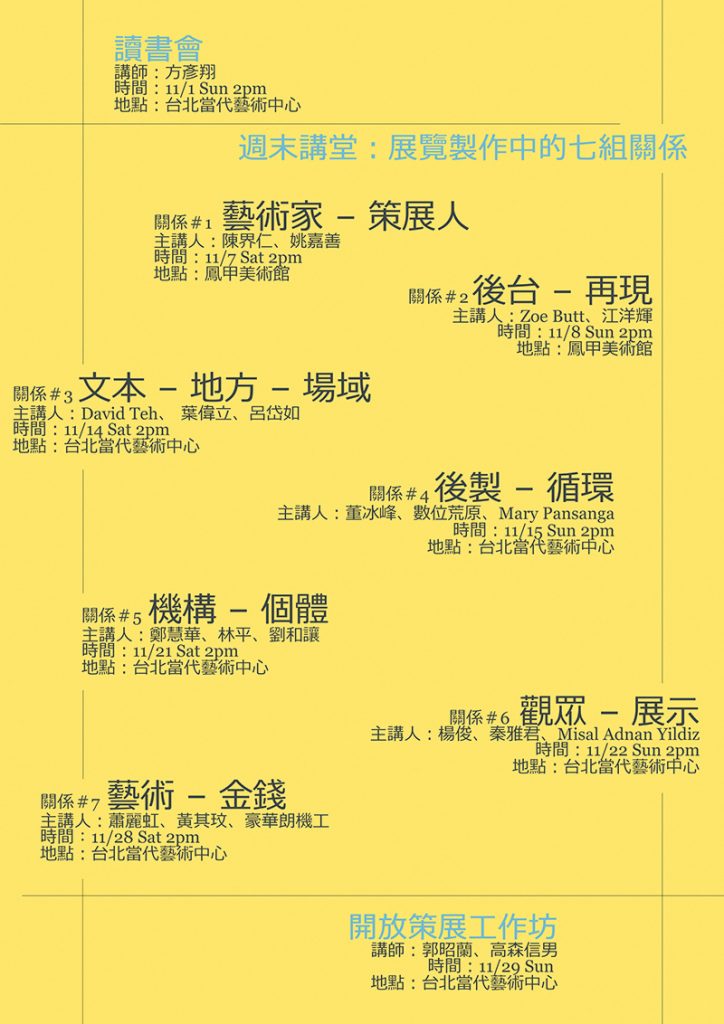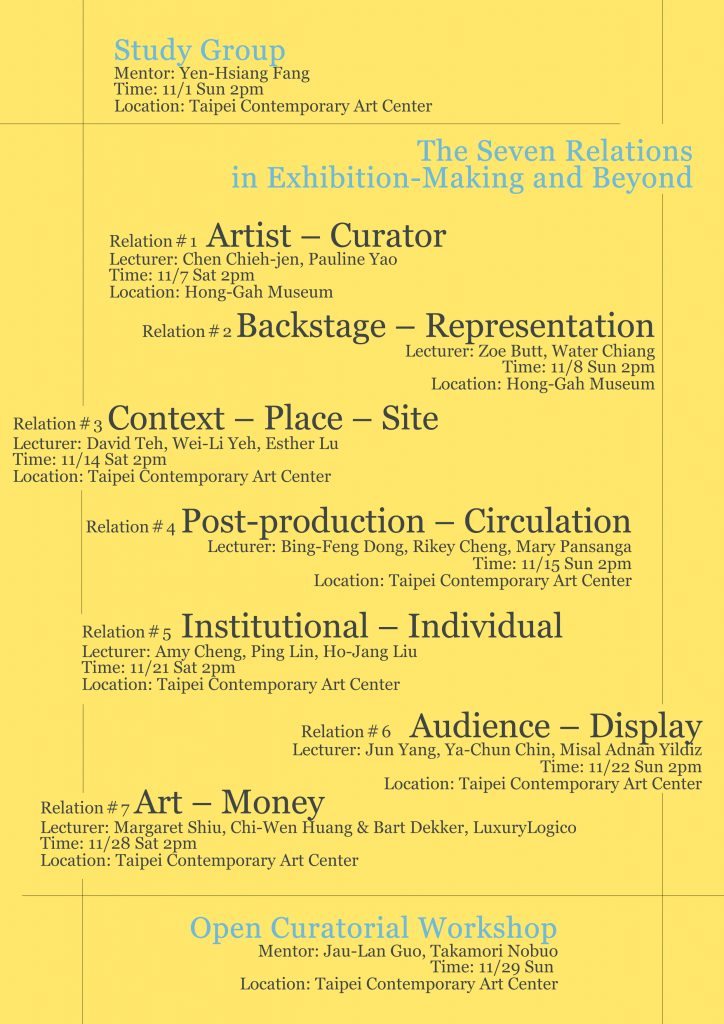 For English version, please scroll down.
For English version, please scroll down.
開放,作為策展實踐的一種態度!
以開放學校的概念,基植於潛力策展人的培力之中。2015開放策展學校透過公開徵件方式,邀集擁有實驗性展覽想法的潛力策展人們,將策展的概念落實於展覽實踐之中!
開放策展學校作為潛力策展人計畫提案的陪跑人,藉由書寫踏查、田野調查、提案演練以及最終展覽發表機會的策展實踐,讓策展的學程脫離單純以學術導向為核心的機制,使策展人的獨立性思考和運作得以彰顯於更多社會對話性空間的實踐中,更自由活潑地開發在地當代藝術環境中的策展潛質空間。策劃國內外主講人、講師親身個別指導的單元(tutorial sessions),刺激潛力策展人提案概念的創作力以及培養策劃敏銳度,培力並偕以量身訂做的工作坊,將策展理論文本的學習直接銜接應用,培養年輕策展人的開放性實踐以及創造一個相互學習的公共平台作為 peer group 的演練基地,並提升對操作的熟悉和敏銳度,讓參與的學員能從活動策辦中直接學習和實踐。而培力最終將提供展覽發表的機會給提案獲選的潛力策展人,以有限的時間單位為策展實踐規則,並以游牧式的空間展示為形式,提供潛力策展人更為自由的議題策劃方式。本培力計畫打造一個知識共享的平台作為培力介面,使策展的背後,不只是展覽!
把策展人議題研究的視野與培力形式放在「概念傾向」之上,開放策展學校希望藉以演練模式(practicing)與串聯概念(networking),創造培力學程的兩大焦點平行結構,搭建一個兼具研究、論述、展示、教育、媒合的學習平台。開放策展學校以建立一個理論與實務並重的培力機制,補充台灣本地策展教育尚顯不足的現況。藉使許多台灣潛力策展人能在學院體系以外,尋求另類的教育場域,獲取更多專業講座與輔導的機會,以學習深厚的策展知識、工具和參與實習的機會。在這樣的背景下,台北當代藝術中心與鳳甲美術館於2014年首次開辦開放策展工作坊,以策展方法學為培力方針並在「田野調查」的主題之下,帶領學員從最基礎的研究工作面向開始認識策展工作,其招生與培力成果,都有具體的成效。2015年度則將擴大舉辦為開放策展學校,成為為期一個月的學程,邀請國際講者共同參與,並針對「展覽製作」進行深度具體的介紹,將在十一月份的連續四個週末中,以主題性的講座和工作坊,從理論和實際案例的探進中,讓學員對當代藝術的策展實踐與藝術生產的現實脈絡和演進,有著超越性的全觀認識介面。
策展本身作為一種實踐之學,培養策展人的途徑則是一項演練與串連的縱向!
如何在策展實踐中習得一番功夫?開放策展學校的工作坊規劃由策展研究方法、田野知識到實務操作的策展學程,著重於實務與理論並進,引領學員了解當代策展的環境與操作方式,並將工作坊視為一個跨學院理論文本的實踐平台與討論空間。以策展角度剖析藝術脈絡,於工作坊中邀集講師策展人以小組討論與一對一諮詢的方式,進而達到對話與交流。並以循序漸進的方式帶領有潛力的策展人著手規畫展覽,進行一場當代策展的思辨之旅,將分析于策展學中不同的實踐模式以及它們隱含的意識形態。
2015開放策展學校的主題設為《展覽製作中的七組關係》,攤開策展方法學的全面基礎結構,從策展文法、媒體、行動上的探討,回應其之於文化與機制環境的狀態,並展開個體性的演練與再詮釋。七個特定題目的系列講座和一個個別輔導性質的工作坊將在一個月份分次展開,這些題目為:1) 藝術家-策展人 (artist – curator), 2) 文本-地方-場域 (context – place – site), 3) 藝術-金錢 (art – money), 4) 機構-個體 (institutional – individual), 5) 觀眾-展示 (audience – display), 6) 後台-再現 (backstage – representation), 7) 後製-循環 (post-production – circulation)
開放策展學校新生訓練的「讀書會」將由策展人方彥翔針對學程進行課前導讀,藉由課程規劃精選的參考書目為基本綱領,並搭配學程的課前讀本,將以讀書會形式進行,提供學員們一個交流與提問的場域。
於「週末講堂」中細緻地展開主題《展覽製作中的七組關係》。
在「藝術家-策展人」的議程裡,我們邀請藝術家和策展人分別從各自的角色出發來談展覽製作上的合作關係和經驗,這兩者的對話往往是展覽形成過程裡最關鍵的培養皿,交織著兩種專業概念的激盪空間,在不同型態、規模條件下的合作,也往往溢出超越展覽製作的生產,我們將從兩方的視角中去再度理解展覽製作裡,能量最為動態的一組合作關係。
「後台-再現」處理的是展覽現場見不到的一組生產關係,從策展人的研究工作、田野踏查、檔案整理、思考演練、多方合作等,一直到思考展覽作為其觀念再現介質時,所真實操作的各項工作。我們將透過策展人的分享,跨到展覽製作的後台,去理解其面對的複雜工作向度。
「文本-地方-場域」將是探索展覽地理文化空間與人文關係的一個議題,在現當代藝術發展的脈絡裡,其應對與言說的對象,往往嫁接著其空間脈絡關係,從現代主義的觀念藝術以降,在地景藝術、機制批判等路徑皆有其不同分支發展,而在晚近不同的公共藝術、參與性藝術、田野研究計畫性的作品表現上,也都常常透過更多人文關係的網絡,發展出更為綿密美學政治關係。我們將透過理解不同方式的操作來理解展覽生產過程裡,從前置的田野到後期的觀眾溝通面向上,如何部署與思考這組議題。
「後製-循環」是思考展覽作為一個知識生產工具所觸及的衍生項目,包括展覽的檔案存檔紀錄、評論書寫、策展學的累進、後續座談、研討、出版項目等新生的知識生產與循環功能,這些涉及了更多與外界專業、觀眾、泛文化的衍生性生產,也將被提出討論,並由更多出版界的專業加入議程。
「機構-個體」是不論從藝術家或是策展人都需要面對的生命政治議題,其中涉及的議題範疇廣闊,從機構自身運作、內外部的合作、與個體之間聯繫的關係,鋪成了藝術生產系統上複雜的合作對話關係。我們將著重於在台灣在地文本中,不同策展機構模式的運作,來思考其中的運作邏輯和特殊角色可發揮的潛力。
「觀眾-展示」是策展人在面對公眾溝通時,最需要思索著墨的介面,其中涉及展覽敘事的各種策略,是文化上、空間上、視覺溝通、文字論述書寫等層層疊置的溝通工作,橋接展覽如何被各種不同文化背景觀眾閱讀的狀態,涉及了更精密的文化分析、空間運動、心理參與向度等細緻的問題。
「藝術-金錢」既是一個展覽製作上的現實條件,也同時是一個藝術經濟創造性的關係。我們將透過不同觀點,諸如藝術家、策展人、畫廊、藝術經紀等的觀察與實踐,去進一步理解展覽製作在這組角力關係中,可以有什麼樣的另類生產方式來循環其中串流的資源,並探究其倫理關係。
工作坊將以2015年開放策展學校的主題《展覽製作中的七組關係》作為文本脈絡的切入點,思考策展實踐中所能展開的實驗性工程與研究深度,以回應當代策展的實踐,並藉由開放策展學校的國際視野,打開潛力策展人的觀看角度,以對在地藝術文本提出雙向的溝通。開放策展學校的入選策展人將於工作坊的參與中進入一個策展知識的開放平台,分享與切磋各自的策展提案並進而落實展覽製作,思考從各自有機的策展實踐中所能展開的媒介與想像工程,進行當代策展的實踐,回應當代藝術創作,並對展覽製作本身的研究提出更具省思的在地文本。
活動聯絡人 彭若瑩 小姐(Miss Jo Ying Peng)
E:joyingpeng@tcac.tw T : +886-2-2550-1231
主辦單位:台北當代藝術中心、財團法人邱再興文教基金會 鳳甲美術館
贊助單位:國家文化藝術基金會
特別感謝:典藏叢書、呂佩怡
“The Seven Relations in Exhibition-Making and Beyond” is the title for the 2015 Open Curatorial School, a program of 7 public seminars and closed-up workshops co-organized by Taipei Contemporary Art Center and Hong-Gah Museum. The school is designed to create a public educational platform as well as to support curatorial developments for 20 emerging curators selected via an open call, offering the opportunity for the final winning proposals from participants to be realized in 2016.
Apart from the public seminars, the Open Curatorial School offers a comprehensive and exclusive exercise opportunity with tutorial sessions from mentors, covering advises for writing, site visit, field research, proposal writing to the final presentation. The program encourages independent thinking and socially engaged practices to discover new potentials and possibilities in the local contemporary art environment. The tutorial sessions with local mentors and international lecturers are created to inspire creativity and sensibility in conceptualizing and realizing a curatorial project. Learnt knowledge and theories could be applied in the customized workshops as well as in the social scenario. The School comes with a peer group framework for participants to learn from one another, allowing discussions and reflections to take place and flow in reality. Two parallel structures support the Open Curatorial School: “practicing” and “networking” are models of exercise in this concept driven program to facilitate a multi-functional knowledge platform for research, discourse, display, network, etc. More than a study course, this year’s program is as well as an exercise experience, offering an exhibition opportunity to the final winning projects: selected proposals to be realized in TCAC and Hong-Gah Museum in the following year.
“The Seven Relations in Exhibition-Making and Beyond” provides a comprehensive introduction to curatorial methodology that responds to the cultural and institutional environment as well as independent reinterpretations of curatorial grammars, media and actions. The 2015 Open Curatorial School will be delivered through 7 public seminars on topics including 1) artist – curator, 2) context – place – site, 3) art – money, 4) institutional – individual, 5) audience – display, 6) backstage – representation, and 7) post-production – circulation.
The artist – curator session invites artists and curators to talk about their collaborative experiences. Their conversations are often the key element to the forming of an exhibition, and are often full of unexpected developments through their different modes of collaboration. This session will try to investigate the most dynamic relation in the exhibition-making process.
The backstage – representation session touches on the productive relations invisible in the exhibition presentation. It will examine curatorial research, field study, archiving, and multilateral collaboration. This session will look at the backstage of exhibition production to understand the complicated parameters of curatorial work through real case studies.
The context – place – site session explores the relation between geographical cultural environment and the human matters. In the contemporary art contexts, there is a particular tendency that leads art project responding to people in a specific context in our complicated society. We can see such historical development from conceptual art, land art, institutional critique, and so on, and each of them develops its own trajectory in considering spatial relations. Recently, there are more thoughts generated from the expressions of public art, participatory art, community art based with more local field research, and they often develop sophisticate relations between aesthetics and politics via complex human connection. This session will try to understand how to contemplate this set of issues in exhibition-making from field work to audience communication, and how best to deploy curatorial agency.
The post-production – circulation session considers how exhibitions and their archives are used as tools for knowledge production, including documentation, commentaries, reviews, collections, seminars, conferences and publications. These tools frequently relate to production in external professions, audiences and other culture. This session also includes perspectives from publishing industry.
The institutional – individual relation is an issue of bio-politics that artists and curators have to come across through the exhibition-making process. It contains a wide range of subjects, from institutional operations to internal and external collaborations, as well as connections between individuals. They constitute complex relations in art production systems. This session will focus on local contexts and various curatorial and institutional models to think about logics and potentials in various roles.
The audience – display session considers the parameter that requires particular attentions from curators in communication with the public and various audience. It involves narrative approaches that communicate via spatial and visual design as well as text distribution. It connects to how exhibitions are understood by audiences from different cultural backgrounds. This session is also related to cultural analysis, spatial movement, and intellectual engagement.
In the art – money session, it does not only address to the real conditions of funding the exhibition-making process, but also to the art & economy ecosystem in a bigger global picture. This session follows observations from artists, curators, galleries and art agents to explore alternative production methods that connect resources and ethical concerns.
The following closed-up workshops are designed to correspond to the theme “The Seven Relations in Exhibition-Making and Beyond,” led by both local and international lecturers to explore experimental engineering and research tools for developing independent curatorial practice in discussions with participants. With a wide range of topics and lecturers from various cultural backgrounds, the Open Curatorial School will open up new visions and dialogues to foster new curatorial knowledge that is reflexive to a wider cultural reality and the local situation. Participants are encouraged to share and learn from each other to respond to the contemporary art making and eventually present a polished proposal with affirmed knowledge. TCAC and Hong-Gah Museum’s second collaboration on curatorial education program aims to enrich the curatorial landscape with native insights and energy, and contribute to generate and shape the local curatorial knowledge.
Sign up: http://goo.gl/forms/oXPG8nGsak
Contact
Miss Jo Ying Peng
E:joyingpeng@tcac.tw T : +886-2-2550-1231
Organizer: Taipei Contemporary Art Center, Hong-Gah Museum
Support by: National Culture and Arts Foundation
Special Thanks: Artco Books, Peiyi Lu



